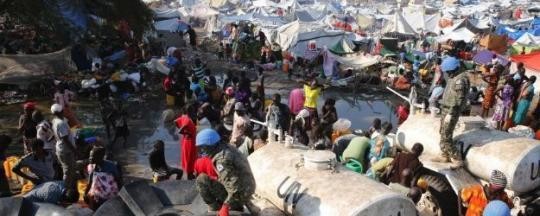Reverend William Tut, a leader of the Nuer community in Bor, the capital of Jonglei, says that nobody from his community can leave the UN base because people have been killed when they tried to do so.
Before mid December last year, Bor had a substantial Nuer minority, while the majority of residents were Dinka. Most of the Dinka civilians have now fled across into Lakes State or south to Juba, while many of the Nuers now live inside the UN base at the edge of town.
Nearly 5,000 people are still living inside the UN base, mostly Nuers with some foreign traders, according to UN figures. Outside, the town is controlled by government forces.
Reverend William Tut, 28 February 2014:
Those of us here inside the UN camp in Bor, we are good but there are some small problems because there are many illnesses, such as illnesses of women and children over the last two weeks, but now it is getting a little better.
Things are going a little better. There are organizations coming to bring medicines, it’s getting better. So the situation inside the UN base here is good, but there is also a little shortage of food because for the sorghum they brought there are no mills to grind the sorghum with. For the elderly and children the food is not good.
There’s no way for people to go out to get other food. We’re staying inside. There’s no way for anybody to go out because when the town was recaptured there were people who said, ‘Now the government has come to the town, it’s possible for people to go out,’ but when they tried to go out at that time, many things happened then – many died.
Because when they tried to go out on that day, for example one guy was working at the Bor Hospital and wanted to go out, there were forces that killed him, and there were teachers who were staying inside here and one went out, and he was killed. So for there is a lot of fear. Nobody wants to go out, because if you go out you can be killed.
It’s not possible we can say how long we’ll be here, whether it’s a month or a year or years, that’s something we can’t say. Maybe if the situation changes we’ll go out, but if it doesn’t change we’ll stay like this. Because until now if somebody goes out he’ll be killed immediately.
But it’s still possible for the Ugandans who are here to go out, and return to the camp – those people won’t have any problem with him. Also the Sudanese, for example the Fur, one can go out and bring some things back in.
Photo: South Korean soldiers provide water at a camp in Bor, 26 Dec. 2013 (Yonhap News Agency)
Related coverage:
Measles outbreak in Bor, Unicef says ‘dire crisis emerging’ (26 Jan.)
Gadet forces withdraw from wreckage of Bor (19 Jan.)




